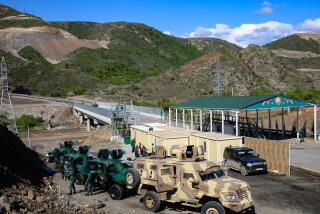Guidelines on Arms Sought Before Summit
- Share via
WASHINGTON — U.S. and Soviet officials are trying to draft joint “guidelines” for arms control negotiations that President Reagan and Soviet leader Mikhail S. Gorbachev could sign at their Geneva summit meeting, Paul H. Nitze, Reagan’s chief arms control adviser, said Friday.
The guidelines are intended to provide a top-level political push to U.S. and Soviet arms control negotiators that would break their stalemate when the talks resume in January, Nitze said. The third round of the Geneva negotiations ended Thursday.
Nitze said he assumes that such guidelines would cover both offensive and defensive weapons systems, but he declined to be more specific because, he said, the guidelines are still being negotiated.
More Positive Assessment
Nitze, whose assessment was more positive than that offered earlier this week by Secretary of State George P. Shultz, left little doubt that the effort would be scrubbed if U.S. and Soviet officials cannot agree on a joint text before the start of the two-day Reagan-Gorbachev meeting Nov. 19.
U.S. officials previously have suggested that Reagan and Gorbachev might issue new instructions to their arms negotiators. But Nitze’s comments, made in a speech to the Overseas Writers Assn., were the first official confirmation that U.S. and Soviet officials are trying to draft such a statement.
The President, meanwhile, said Friday that he will be going to Geneva “with a sense of confidence and optimism based on the knowledge that over the past five years we have restored America’s strength and international standing.
“We face a difficult negotiating task in Geneva,” Reagan told Republican congressional leaders. “We do not view Geneva as an end in itself but rather part of an ongoing process.”
His remarks to the closed meeting were relayed to reporters by White House spokesman Larry Speakes.
Gorbachev ‘Needs Love Too’
In another meeting, Reagan told a group of religious leaders that he wants to have regular summits in the future, either in Washington or Moscow. Charles Stanley, president of the Southern Baptist Convention, said that Reagan also told the churchmen to pray for Gorbachev because “he needs to be loved also.”
“We are bringing a broad agenda to Geneva focusing on the full spectrum of U.S.-Soviet relations, not just arms control but regional conflicts, bilateral relations and human rights,” Reagan told the GOP lawmakers. “At the same time, we are not making any artificial linkage among these areas.”
A senior White House official said that Reagan is determined not to allow the summit to focus exclusively on arms control, which he said is the “Soviet agenda.”
“We don’t have grandiose ideas about converting societies,” the official said. “We’re not going to paper over issues and shut up about things we don’t like. We’re not going to make it an arms control meeting.”
Nevertheless, arms control appears to be the one topic on which Reagan and Gorbachev could reach some sort of consensus at their Geneva sessions. The senior White House official conceded that there is little chance the two sides could reach significant agreements on regional issues, bilateral matters or human rights. The Soviets have refused even to include human rights on the formal agenda.
Nitze, a key national security adviser since the Eisenhower Administration, said the United States has no interest in a Soviet proposal for an “agreement in principle” on arms control. He said the guidelines--if they can be hammered out--would be something less formal than the Soviets envision.
‘Bad Luch With Agreements’
“We’ve had bad luck with agreements in principle that we have worked out with the Soviet Union in the past,” he said. “You don’t have time to work out details at Geneva (during the summit) and you don’t have an agreement in principle unless you know what the details will be. But it might be possible to agree on guidelines to our negotiating teams.”
In their latest exchange of proposals, the United States and the Soviet Union have crept surprisingly close to each other on proposed numbers of strategic weapons. For instance, Washington proposes a cap of 3,000 on intercontinental ballistic missile warheads while the Soviets are proposing a 3,600 limit. Both sides say they generally favor a 50% cut in numbers of offensive systems.
But the arms talks are deadlocked over the U.S. Strategic Defense Initiative, popularly known as “Star Wars.” Reagan has said that he will accept no limits on missile defense research while the Soviets have said there will be no agreement unless the United States scraps the plan.
The senior White House official who briefed reporters on the understanding that he not be identified conceded that the Soviets have shown no interest in Reagan’s proposal for joint efforts to solve regional conflicts in Nicaragua, Ethiopia, Angola, Cambodia and Afghanistan--all countries in which Soviet-backed governments are facing anti-Communist insurgencies. On the contrary, he said, the Soviets have stepped up their military actions in Afghanistan in recent weeks.
Times staff writer Eleanor Clift contributed to this story.
More to Read
Sign up for Essential California
The most important California stories and recommendations in your inbox every morning.
You may occasionally receive promotional content from the Los Angeles Times.













